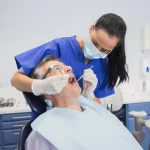Dental emergencies can happen when you least expect them, whether it’s a sudden toothache, a knocked-out tooth, or a chipped filling. Knowing how to respond quickly and appropriately can make all the difference in protecting your dental health and avoiding further complications. Here’s a comprehensive guide on what to do when faced with a dental emergency.
1. Stay Calm and Assess the Situation
The first and most important step in any emergency is to stay calm. Panicking can make the situation worse and cloud your judgment. Take a moment to assess what happened and determine the severity of the issue. If there is significant bleeding, swelling, or pain, proceed to the next steps.
2. Common Dental Emergencies and How to Handle Them
Toothache
A toothache can arise from various causes, including cavities, infections, or trauma.
- Rinse your mouth with warm water to remove debris.
- Use dental floss gently to ensure no food particles are stuck between your teeth.
- Apply a cold compress to the outside of your cheek to reduce swelling.
- Avoid placing aspirin directly on the gum or tooth as it can burn the tissue.
- Contact your dentist near you as soon as possible, especially if the pain persists.
Knocked-Out Tooth
A knocked-out tooth is one of the most time-sensitive dental emergencies.
- Pick up the tooth by the crown (top), not the root, to prevent damage.
- Rinse it gently with water if dirty, but do not scrub.
- Attempt to place the tooth back in its socket if possible. If not, keep it moist by placing it in a container of milk or your saliva.
- Seek emergency dental care immediately. The sooner you act (ideally within an hour), the greater the chance of saving the tooth.
Chipped, Cracked, or Broken Tooth
- Rinse your mouth with warm water to clean the area.
- Apply a cold compress to minimize swelling.
- Save any tooth fragments, if possible.
- Avoid chewing on the affected side until you see your dentist.
Lost Filling or Crown
Losing a filling or crown can expose sensitive areas of the tooth.
- If a filling is lost, temporarily seal the area with sugar-free gum or dental wax.
- If a crown falls out, try placing it back over the tooth using dental adhesive or toothpaste (not glue).
- Contact your dentist for prompt repair.
Abscess or Infection
An abscess is a painful infection that can occur at the root of a tooth or between the gum and tooth.
- Look for symptoms like severe pain, swelling, fever, or a pimple-like bump on the gums.
- Rinse your mouth with a saltwater solution (1/2 teaspoon of salt in 8 ounces of water) to help draw out infection.
- Seek immediate dental care as untreated infections can spread and become life-threatening.
3. When to Seek Immediate Medical Help
Some dental emergencies require urgent attention beyond your dentist’s care:
- Uncontrolled bleeding from the mouth
- Severe swelling that affects breathing or swallowing
- Trauma to the jaw or face causing significant injury
- High fever or chills alongside dental pain (signs of infection)
In these cases, head to the nearest emergency room immediately.
4. Preventing Dental Emergencies
While accidents happen, there are steps you can take to reduce the risk of dental emergencies:
- Wear a mouthguard during sports or activities with high injury risks.
- Avoid chewing on hard foods like ice, popcorn kernels, or pens.
- Maintain good oral hygiene with regular brushing, flossing, and dental check-ups.
- Address dental issues early to prevent complications.
5. Be Prepared: Dental Emergency Kit
Having a dental emergency kit at home can help you act quickly. Include the following items:
- Gauze pads
- Small container with a lid (for knocked-out teeth)
- Dental wax
- Salt packets (to mix with water for rinsing)
- Pain relievers (non-aspirin)
- Cold compress or ice pack
- Dental floss
Dental emergencies can be stressful, but knowing what to do in the moment can protect your oral health and prevent further damage. If you experience any dental emergency, contact your dentist immediately. Quick action, combined with professional care, ensures the best possible outcome for your smile.






